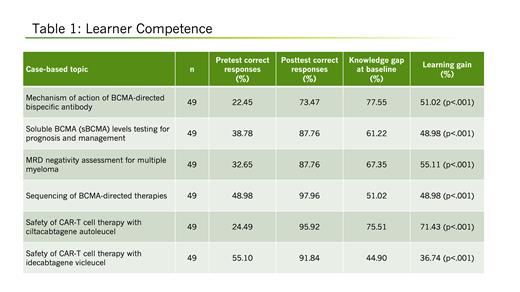Background: Multiple myeloma (MM) treatments have grown more complex in the past 5 years, with several approved treatment options targeting B-cell maturation antigen (BCMA) and emerging data around soluble BCMA and sequencing BCMA-directed therapies. Understanding these new diagnostic and treatment paradigms is important to inform rational clinical decision making in MM. Video platforms such as YouTube and VuMedi can provide a convenient and costless method to deliver content, but their ability to reach and teach US physicians has not been studied extensively for MM. We investigated usage and pre/post survey data from viewers of a continuing medical education (CME) video activity about BCMA in MM, which was available on several online platforms.
Methods: We developed a CME-approved lecture with Hematology/Oncology Fellows as a target audience. The video entitled Leveraging BCMA-Directed Therapies for Improved Patient Outcomes in Relapsed/Refractory Multiple Myeloma discussed BCMA-targeting therapies and soluble BCMA in the context of a larger framework around risk assessment and treatment decision making in MM. The 1.00-hour streaming video lecture was made accessible as a CME-approved enduring webinar archive starting on May 23, 2023, on the i3 Health website, YouTube, and VuMedi. Viewers could receive CME credit by completing assessments and evaluations on the i3 Health website, which included repeated-pairs pre- and post-activity case-based questions and self-perceived gains in confidence and competence using 5-point Likert scale questions. Responses were analyzed descriptively, with Fisher's exact test used to compare responses to questions.
Results: At the 2-month follow-up date of July 23, 2023, the video has been viewed 211 times, with 55 views on i3 Health, 139 views on YouTube, and 17 views on VuMedi, representing viewers from across the US and internationally. Baseline assessment data revealed gaps in knowledge in all areas that were addressed by the activity (Table 1). For learners who completed the assessments in the enduring activity, the mean score for all topics combined rose by 52% (37% vs 89%). The activity resulted in significant gains in knowledge and competence related to these topics, with P < 0.001 for all learning gains (Table 1). Upon completion of the activity, 96% of learners self-reported that knowledge acquired from this activity would be utilized to improve the outcomes of their patients, and 96% of learners self-reported that based on the information learned during the activity, they felt more confident in treating patients with MM.
Conclusion: Over 200 US viewers from both rural and urban areas have viewed this lecture, primarily on YouTube but also on other platforms. Based on viewership of i3 Health's accredited activities from the past year, more than 1,200 viewers from 30 countries are expected to be represented by the end of the 12-month period. The post-activity assessment demonstrates notable areas of knowledge gains around BCMA-directed therapies in MM. The improvements in competence seen on the case-based assessment questions, as well as gains in self-perceived competence and confidence in treating patients with cancer, show significant impact and the educational benefits of online video viewing.
Disclosures
Heller:Novartis: Current equity holder in publicly-traded company; GlaxoSmithKline: Current equity holder in publicly-traded company. Banerjee:BMS: Consultancy; Janssen: Consultancy; Genentech: Consultancy; SparkCures: Consultancy; Sanofi: Consultancy; Caribou: Consultancy; Pfizer: Consultancy; Pack Health: Research Funding.


This feature is available to Subscribers Only
Sign In or Create an Account Close Modal